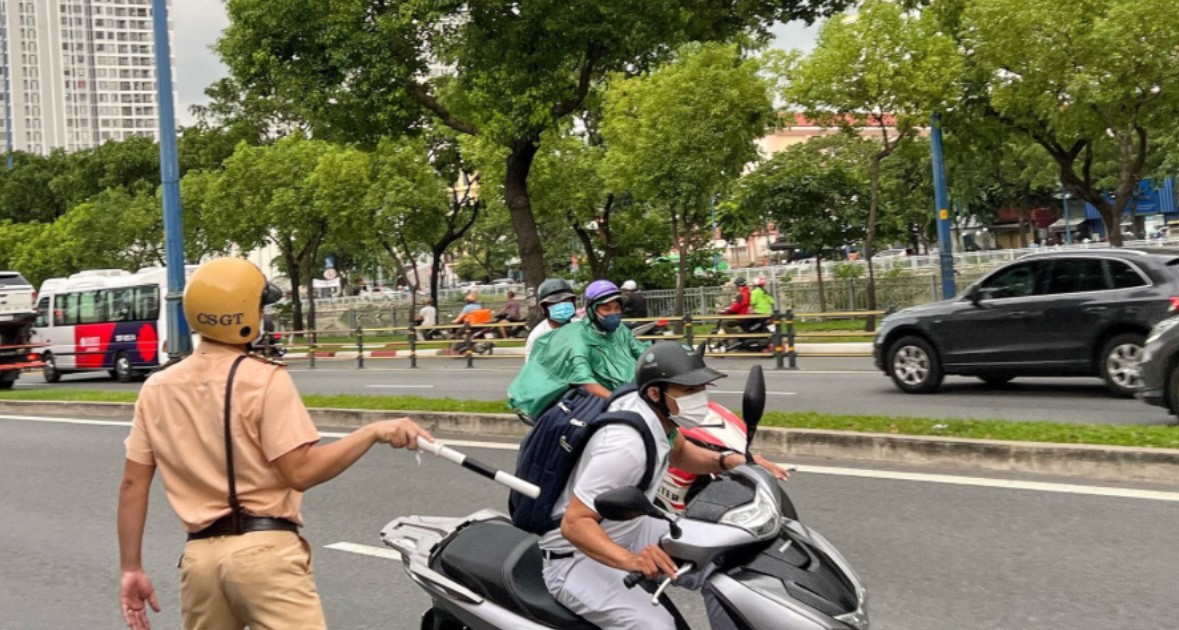From 1/1/2025, traffic fines for motorcycle riders who violate road rules will increase significantly. To avoid paying the fines, many individuals have chosen to abandon their vehicles. What consequences will these individuals face?
Decree 168/2024/ND-CP, effective from 1/1/2025, stipulates administrative fines and point deductions for road traffic order and safety violations in the field of road traffic, as well as license point restoration.
According to this decree, riders who go against the flow of traffic, ride on pavements (except when entering a house or office), disobey traffic light signals, ride motorbikes without license plates, or use license plates that do not match the registration certificate or are not issued by competent authorities, will face fines ranging from 4 to 6 million VND.
Fines from 8 to 10 million VND will be imposed on those who ride motorbikes in a reckless manner, use their feet or other objects to touch the ground while riding, ride in groups of two or more and exceed speed limits, or continuously use horns or rev their engines in residential areas.
The decree also specifies fines ranging from 10 to 14 million VND for those who exceed speed limits and cause traffic accidents, or ride on expressways.
In addition, individuals operating motorcycles while under the influence of alcohol will be fined between 2 and 10 million VND.
As the penalties for traffic violations are quite high, many individuals choose to abandon their vehicles and avoid paying the fines when caught by the authorities.
Regarding the legal consequences of such actions, Lawyer Le Hong Van from the Hanoi Bar Association stated that according to Article 74 of the amended Law on Handling Administrative Violations, the statute of limitations for executing administrative violation handling decisions is one year from the date of the decision. After this period, the decision will not be executed, except in cases where the handling decision includes the application of confiscation of violating objects, means, or recovery measures, which must still be carried out.
In cases where the violating individual or organization deliberately evades or delays the execution of the decision, the statute of limitations shall be calculated from the time of cessation of such evasive or delaying actions.
Therefore, if a traffic violator abandons their vehicle to evade the fine, the statute of limitations for executing the fine shall be calculated from the time they stop evading or delaying the payment.
If the individual still fails to comply with their obligations after the above-mentioned period, they may be subject to enforcement measures such as:
– Deduction of a portion of their salary or income, or money from their account.
– Seizure and auction of their property equivalent to the value of the fine.
– Collection of money or other assets held by a third party if the violator intentionally dissipates their assets.
– Forced compliance with the consequences as stipulated.
Hence, if a traffic violator chooses to abandon their vehicle and not pay the fine, they will still be liable to pay the administrative fine, and if they refuse to comply with the decision, they may be subject to enforcement actions.
Regarding the handling of vehicles left unclaimed by violators after the temporary holding period has expired, according to Article 126 of the amended Law on Handling Administrative Violations, if the violator, owner, manager, or lawful user does not claim the vehicle within one month from the second notice, the competent authority must decide to confiscate the violating vehicle within five working days.
H.L (ANTĐ)









































